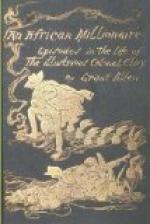This discovery was most important. We stood now within measurable distance of catching Colonel Clay, and bringing forgery and fraud home to him without hope of evasion.
To make all sure, however, Medhurst communicated with the Paris police, and showed us their answers. Meanwhile, Charles continued to write to the head of the firm, who had given a private address in the Rue Jean Jacques, alleging, I must say, a most clever reason why the negotiations at this stage should be confidentially conducted. But one never expected from Colonel Clay anything less than consummate cleverness. In the end, it was arranged that we three were to go over to Paris together, that Medhurst was to undertake, under the guise of being Sir Charles, to pay the two thousand pounds to the pretended financier, and that Charles and I, waiting with the police outside the door, should, at a given signal, rush in with our forces and secure the criminal.
We went over accordingly, and spent the night at the Grand, as is Charles’s custom. The Bristol, which I prefer, he finds too quiet. Early next morning we took a fiacre and drove to the Rue Jean Jacques. Medhurst had arranged everything in advance with the Paris police, three of whom, in plain clothes, were waiting at the foot of the staircase to assist us. Charles had further provided himself with two thousand pounds, in notes of the Bank of France, in order that the payment might be duly made, and no doubt arise as to the crime having been perpetrated as well as meditated—in the former case, the penalty would be fifteen years; in the latter, three only. He was in very high spirits. The fact that we had tracked the rascal to earth at last, and were within an hour of apprehending him, was in itself enough to raise his courage greatly. We found, as we expected, that the number given in the Rue Jean Jacques was that of an hotel, not a private residence. Medhurst went in first, and inquired of the landlord whether our man was at home, at the same time informing him of the nature of our errand, and giving him to understand that if we effected the capture by his friendly aid, Sir Charles would see that the expenses incurred on the swindler’s bill were met in full, as the price of his assistance. The landlord bowed; he expressed his deep regret, as M. le Colonel—so we heard him call him—was a most amiable person, much liked by the household; but justice, of course, must have its way; and, with a regretful sigh, he undertook to assist us.




